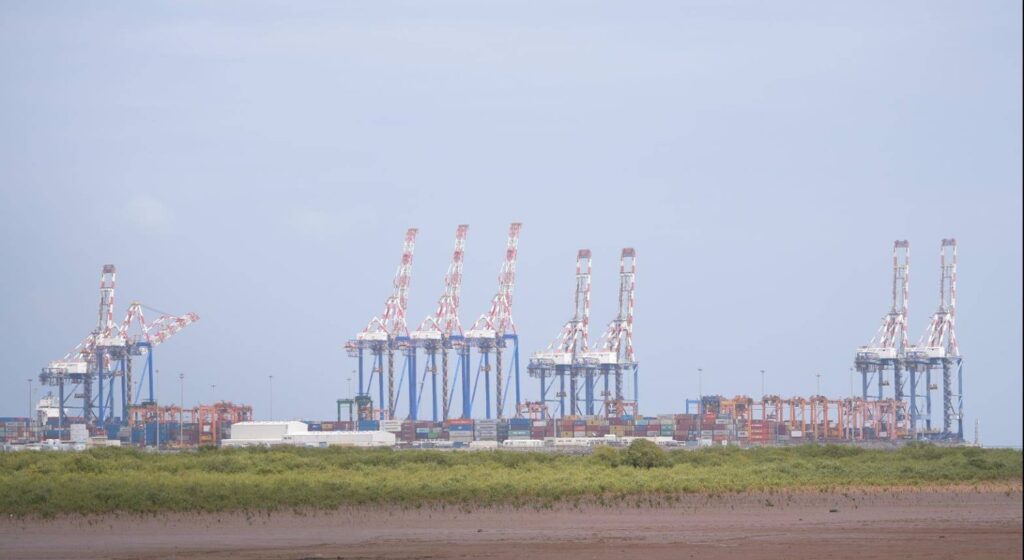The unrest in the Bab al-Mandab region, the Red Sea, and the Gulf of Aden has contributed to the recovery of container handling operations in Djiboutian ports in recent months, according to Djiboutian officials.
Container handling at Doraleh Port, Djibouti’s largest port, increased by up to 10% compared to the previous months, officials told Asharq Al-Awsat.
Houthi attacks on commercial ships in the Red Sea caused a sharp rise in marine shipping insurance, with fees imposed to cover risks associated with conflicts.
Since November 2023, the Iranian-backed Houthis have been carrying out attacks on commercial ships in the Red Sea that they suspect are linked to Israel or heading to its ports.
They say that this comes in support of the Gaza Strip, which has been witnessing a war since Oct. 7, 2023.
Washington and London have also launched joint military strikes on Houthi positions inside Yemen several times since last Jan. 12.
Advisor of the CEO of Operations at Doraleh Port Ismail Hasan told Asharq Al-Awsat that the port served more than 100,000 containers with an average of 60-70 ships of various sizes last January, and it can receive the largest ships in the world.
All international shipping and navigation companies are in Doraliya Port, serving over 60 ports worldwide.
Last January, the port witnessed an increase in handling by a rate of 5-10% compared to previous months.
During Asharq Al-Awsat’s visit to Doraleh Port, the Chinese ship Zhong An Xin Huayuan was anchoring for the first time, according to Hasan.
He explained that the tensions in the Red Sea led new shipping companies to enter as new clients of the Djiboutian ports.
Djibouti has about five specialized ports, including Doraleh Port, and others for various goods, commodities, and iron, some of which are dedicated to energy.
Several Chinese shipping lines have been redeploying their vessels to serve the Red Sea and the Suez Canal in what analysts have said is an effort to exploit China’s perceived immunity from the Houthi attacks that have driven most other operators out of the area, according to the Financial Times.
The newspaper said two vessels were listed on the website of Qingdao-based Transfar Shipping, which describes itself as “an emerging player in the transpacific market” as part of its fleet list.
However, Transfar said on Friday that it had stopped operating the ships in February 2023 and needed to know which company was using them now.
The report stated that the move of Chinese lines to the Red Sea comes after most big container shipping lines — including China’s Cosco, operator of the industry’s fourth-biggest fleet —abandoned the southern Red Sea because of the security risks.
According to Hasan, Djibouti seeks to become a global hub that serves most of the markets, extending from China in the east through the Middle East and the Mediterranean all the way to Northern Europe.
According to official statistics, Djibouti ports witness daily transit of about 90 ships, 59% of which are coming from Asia, while vessels from Europe represent 21%, while other continents, including Africa, represent 16%.
According to the International Monetary Fund (IMF), maritime transport through the Red Sea decreased by approximately 30% in one year.
The International Chamber of Shipping says the Red Sea is a vital route that usually carries about 12% of global trade.
Doraleh Port, established in 2009, is about three kilometers from the gate to the edge of the sea, with a depth of 20 meters and a width of 1,050 meters, and it is considered one of the largest container ports in Africa.
Hasan told Asharq Al-Awsat that the port was equipped with the most advanced handling machines in the world, and it began operating only about three months ago.
The port ranked first in Africa for three consecutive years, and there are 30 mechanisms dedicated to distributing containers registered in a system with unique codes.
Some containers are destined for domestic and neighboring countries, and others are being re-exported to other international ports.
He explained that all the working crews are Djiboutian, with 800 full-timers and about 1,000 hired when needed.
Hasan addressed the establishment of a seaport for Ethiopia in Somaliland after announcing an initial agreement between the two sides, indicating that this would not affect the Djiboutian ports.
The advisor asserted that establishing an Ethiopian port in Somaliland would not affect the Djiboutian ports.
– Freight train to Ethiopia
Doraleh Port is directly connected to the main train terminal to transport goods from the port to Ethiopia.
Djibouti is the main gateway for Ethiopian imports and exports to and from the world.
According to the advisor, the train’s journey from the port to Metu in Ethiopia takes 10 to 12 hours before continuing its way to Addis Ababa.
Hasan pointed out that three train lines can be operated simultaneously, while two trains run daily to Ethiopia, with an average of 106 containers for each train.
The Addis Ababa-Djibouti railway line is the first electric-powered railway line designed to Chinese specifications.
Djibouti and Ethiopia benefit from it by establishing industrial and logistical zones and constructing new cities and villages along this line, which passes through the Horn of Africa.
Ethiopia, which exports and imports nearly 90% of goods through Djibouti ports, has plans to expand the train network to extend to Sudan, Kenya, and South Sudan.
